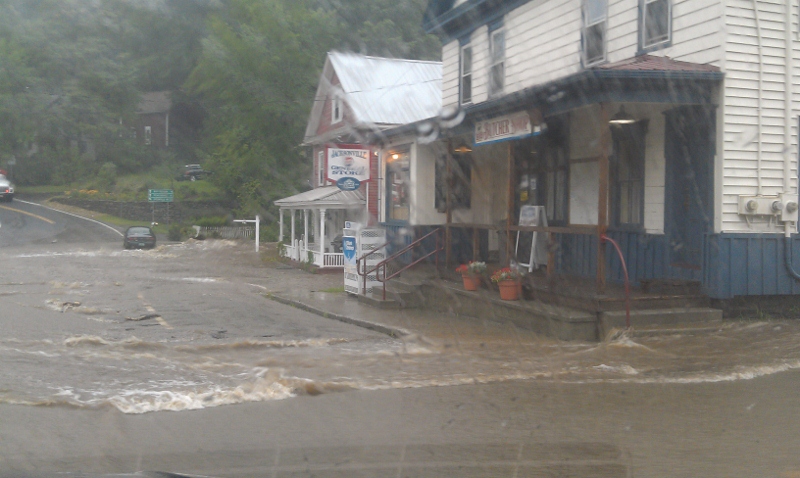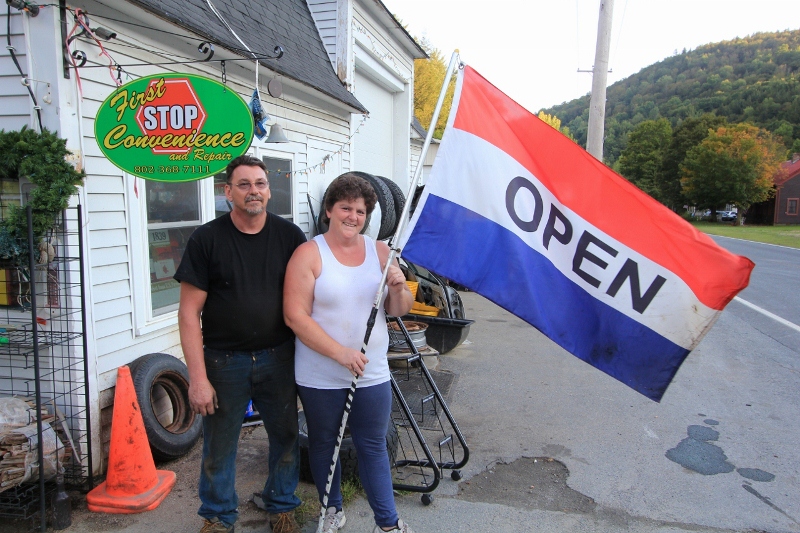
It was still early in the day on August 28th, 2011, when the flood waters breached the river bed and began to spill across the parking lot and into the First Stop Convenience and Repair gas station in Whitingham, Vermont. Owners Jennifer and Norman Herzig scrambled to save everything they could. Propane tanks were quickly moved to higher ground, coolers were emptied and products stacked high on tables to the ceiling, as far from the rising flood waters as possible. The Herzigs moved a few of their vehicles to higher ground. Three others were lost, found twisted in a deep hole that opened up suddenly when the torrents of water swept through, taking the pavement in its current.
Hurricane Irene had just hit the small town of Whitingham in Southern Vermont. While the storm passed by New York City with barely a sprinkle of rain, and the forecast called for high winds, the storm that finally battered southern Vermont was a slow, relentless rain that soaked the area, breaking dams, flooding homes, destroying businesses and washing away roads throughout the region. It was described as the worst disaster in the State of Vermont since the epic flood of 1927.

Jacksonville Center, Photo Courtesy of Gretchen Havreluk
Amidst this chaos and destruction, the Herzigs, like so many of their neighbors and fellow business owners in this small town in southern Vermont, were concerned with helping others. They checked several times on the elderly neighbors across the street and encouraged them to move to a safer location. As they watched cars of evacuating residents drive by, they stopped them to hand out food and other supplies.
Herzig recalls, "We were giving away freezer stuff that I wasn't sure would last. Stuff they could eat while they were stranded. We waddled through the water and went down the road." Around mid-morning, when the fire department arrived to tell them to evacuate the premises, the Herzigs grabbed their paperwork and computer and gave one last look at the store, not knowing what would be left when they returned.
First Stop alone suffered $77,000 in damage and is still recovering from the destruction caused by the hurricane.
Meanwhile, down the street in the Village of Jacksonville, friends and neighbors gathered at the home of Adam Buursma. His house is about six feet higher than the downtown area and was thus spared the brunt of the flood waters. Buursma described the scene during the day as more and more people took refuge in his home. "We had dogs and friends and neighbors all over at our place. People were just shocked. We thought it would be gale force winds and pumping rain. You didn't think there would be a tidal wave coming through town."
In the course of just a few hours, the 11 inches of rain that Irene brought to the area caused nearly one million dollars of damage to the town of Whitingham and its 1,200 residents. For several days, the community was cut off from nearby cities of Greenfield, Brattleboro and Bennington, and many residents could not get to their jobs. Within a few days, the National Guard arrived, bringing palettes of potable water to distribute around town. First Stop supplied gas for local residents, state vehicles and the dozens of contractors and excavators working around the clock to repair roads.
In Whitingham and Jacksonville, the businesses and homes along Route 112 suffered the worst of the damage. The Honora Winery lost their offices and nearly their entire inventory in the storm, and was only fully reopened in May. Jacksonville Electric, who supplies power to 700 customers in the area, had their building destroyed as well. Owners Pam and Gordon Moore returned to their business to find the driveway gone and the building filled with mud, sticks and dirt deposited by the flood waters that had rushed through.
Basements were flooded throughout the town and many families are still coping with water and mold problems, but despite the massive damage the hurricane wrought, Whitingham fared better than many of the surrounding towns. Many Whitingham residents credit fire chief and road commissioner Stanley Janovsky with preventing what could have been a much worse disaster. According to Wayne Corse, owner of Corse Excavating, "Stanley Janovsky did a job second to none in terms of getting it organized. He did a fabulous job of getting right to the task at hand."
In the hours leading up to the storm, Janovsky cleared out culverts, sharpened chain saws and made sure the town vehicles and equipment were fully fueled. He lined up an emergency crew of local residents and private excavating companies to be on call. "I gave each company a certain section of town to keep the culverts open as it was storming," Janovsky explained.
Janovsky's preparation helped prevent chaos and allowed for a quick recovery in the town. From the early morning on the 28th, Janovsky and his crew worked rapidly to clear culverts and downed trees, and fix the 22 out of 71 town roads that had been washed out. Corse described the massive amounts of water. "I was out there that morning and we were trying to keep the roads from washing out. There was so much force to the water. If you put a shovel or stepped into a 15-inch culvert, it would suck you right in."
Connie Burnell, owner of Stone Soldier Pottery in Jacksonville, commended the efforts of Janovsky and his crew. "All the workers that put the roads back together -- they need a medal. They did a magnificent job and took care of what had to be taken care of."
The local fire department also went door to door evacuating residents from the villages of Whitingham and Jacksonville and encouraging them to wait out the storm on higher land. Town clerk Elmira Aikus recalls Janovsky wading across Route 112 to help evacuate a resident. "The water was almost chest high, but he went to this house to get a grandmother and child out."
At the Whitingham Elementary School, which was set up as a designated Red Cross Shelter, about 50 people gathered while other residents delivered food and supplies to their stranded neighbors.
When 911 lines went down, and with much of the area not serviced by cell phones, Janovsky set up a crew at the Whitingham firehouse screening calls, handling emergencies and communicating via radio.
His preparedness paid off, and within 24 hours nearly all residents were able to return home and all of the town roads were passable. Still, Janovsky never expected the extent of damage that Irene wrought, "It was very shocking. I didn't think we would have a whole lot left after. I was glad it stopped raining when it did. I've never seen anything like it. Only a few people can remember the 1938 flood. Even the one in '73 -- this was a lot worse."
The day after the storm saw most of Whitingham's residents pitching in to help with the cleanup. Resident Jen Engel recalls, "It was amazing how people just immediately panned together. We organized a bunch of work crews to come down to Jacksonville. We set up pumps in people's basements and cleaned up before the mold could come in. All the townspeople came together and pooled their resources."
The immediate response throughout the town was one of action and lending helping hands to those who were worse off. Herzig credits this outpouring of support with saving his business. "If it wasn't for the people who came in the next day and said, 'what can we do?' I would have just closed the door." For days after the storm, around 50 local residents pitched in each day at First Stop while a neighbor across the street cooked lunch and dinner for the crew.
Speaking with residents of Whitingham who lost driveways, basements, businesses and equipment in the disaster, there is a remarkable lack of self-pity. Despite the massive damage that the Honora Winery suffered in the storm, event manager Lorraine Muha explains this attitude, "The first day you just cry. The second day your pull up your boot straps and get to work. That's what the entire community did. Everyone in the area did. The entire state of Vermont did that."
Burnell agrees, "Vermonters are pretty stoic. We get to what needs to be done and that's it. It's a wonderful characteristic that Vermonters are so hardworking and get the job done when it needs to be taken care of."
Many residents immediately pointed out that nearby Wilmington was harder hit. For Aikus, this selflessness is among her most poignant memories of the day. "What sticks out most in my mind, aside from the devastation the hurricane left in its path, was that while people were wallowing in the mud here in the center of Jacksonville, when they saw the National Guard go through, they were clapping and cheering as they headed to Wilmington. The support of these people who needed help themselves, but were so glad to see the National Guard headed to Wilmington where people needed even more help."
Reflecting back a year after Hurricane Irene devastated the Deerfield Valley region, resident Gretchen Havreluk feels like not much has changed in the community. "Whitingham and Jacksonville are a tight community. They rally for each other and that's never changed. I don't think it changed the community as a whole because it's what we do here. It's what we know."
On the one year anniversary of the flood, Herzig stood inside her store as a steady stream of customers came in and out. While remembering the storm is still painful at times, Herzig is confident in the community's resiliency. "We are Vermont strong and we'll be here."

Norman and Jenny Herzig, Photo by Ori Kaplan
A version of this article also appears in The Deerfield Valley News.